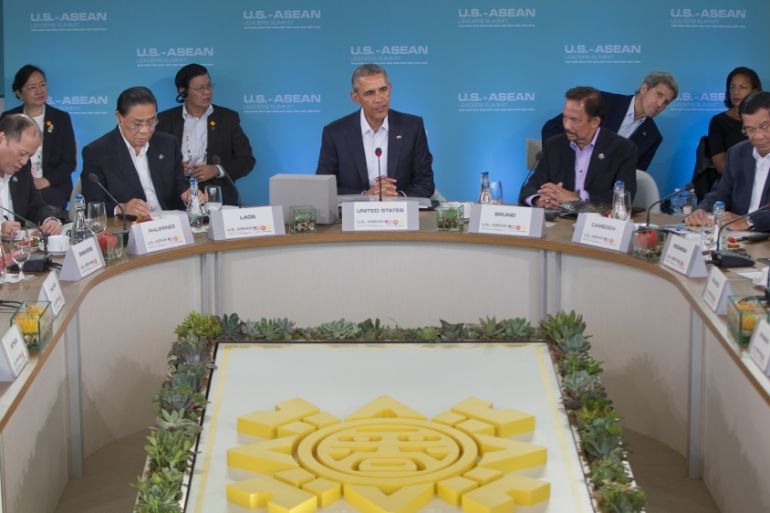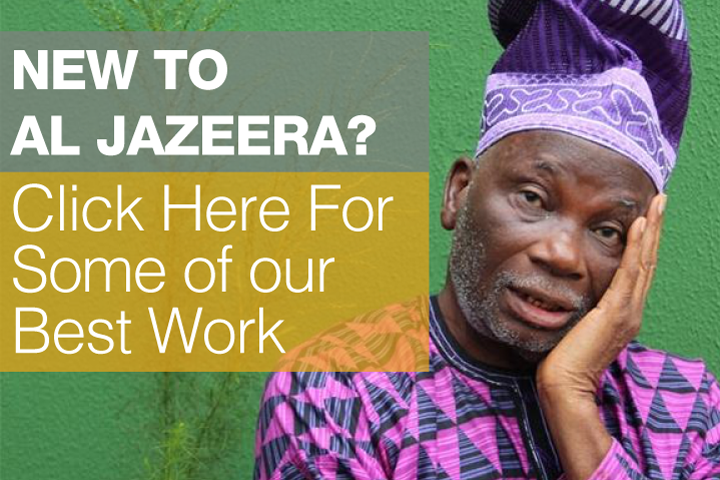REPORTER'S NOTEBOOK
ASEAN legitimises human rights violators: Protesters
Protesters say human rights have been swept aside as leaders gather in California for Southeast Asian Nations meeting.

Published On 16 Feb 2016
For journalists, covering meetings of the great and powerful can be an oddly isolating experience, and the US-Association of Southeast Asian Nations (ASEAN) Summit is no exception.
US President Barack Obama, 10 leaders of Southeast Asian countries that make the international organisation, and hundreds of journalists from around the world gathered in the California desert near the opulent retreat called Sunnylands, near the city of Rancho Mirage.
On day one, the media was herded, under heavy security, to a large, air-conditioned white tent where we sat at rows of tables typing furiously on laptops. No one in the tent would ever glimpse the summit participants except on large video screens.
Many reporters, videographers and producers seemed much more interested in the buffet set up in a corner of the tent and especially in the bottles of iced water provided. Outside, the sun beat down under a cloudless sky and the temperature at midday was 36.8 C.
Media members crowded around the video screens to watch Obama shaking hands and greeting the leaders as, one by one, they exited their limousines and walked up to the mansion’s main entrance.
Sultan Bolkiah pilots his jet
Some colourful personalities are among the ASEAN elite. Sultan Hassanal Bolkiah, the hereditary leader of the oil-rich mini-state of Brunei, arrived after piloting his own personal Boeing 747 jumbo jet across the Pacific.
Obama has a warm smile for the sultan, who recently approved laws that would penalise gay people as well as women engaging in extramarital sex with death by stoning.
Also getting the US president’s grip-and-grin treatment was Malaysian Prime Minister Najib Razak, who last month was cleared of wrongdoing in connection with a mysterious $681m deposit into his personal bank account. Malaysia’s attorney-general, a Razak appointee, declared that everything was OK because the money was merely “a gift” from Saudi Arabia’s ruling family.

Later, the “pool feed” cameras broadcast a video of Obama and his guests sitting around a large U-shaped table. Obama made some bland remarks about how important the gathering was, and that, pretty much, was that. No more pictures for the day.
Earlier, Susan Rice, the US ambassador to the UN, spoke to reporters at a hotel a few kilometres from Sunnylands. She stressed the importance of US-ASEAN trade, worth approximately $225bn.
Rice took questions about China’s assertiveness in the South China Sea, and whether Obama and his guests would discuss North Korea’s recent launch of a rocket into space. But the press were clearly bored with the subject of US-Asia relations, and veered off into questions about Syria and Libya.
Rice’s news conference was officially over when an Al Jazeera reporter requested that she address issues of human rights in connection with the summit. Rice, seeming slightly peeved, responded: “Just because in Asia as elsewhere we are obliged to talk to governments, including those with whom we have significant disagreements on things like human rights, does not mean that we are legitimising them.”
After Rice left, a young White House press official took more questions. Now the press really perked up. They fired off question after question – not about ASEAN or human rights, but about the latest political manoeuvring over filling the Supreme Court seat left vacant by the abrupt death of Justice Antonin Scalia over the weekend.
Protests
Several kilometres away, at the intersection of Bob Hope Drive and Dinah Shore road, about a thousand protesters would have emphatically disagreed with Rice.
Waving banners and flags, Laotian-Americans, Cambodian-Americans and opponents of the Trans-Pacific Partnership trade agreement chanted and held up hand-made placards. Bona Chhith, a member of the Cambodian-American Alliance, said that legitimising human rights violators was precisely what the Sunnylands Summit was doing.
“You are bringing a bunch of dictators to Southern California,” Chhith said. “They are killing their own people, oppressing their own people. The oppression has to stop.”
Teenager Mack Kahamphavong, whose mother and father emigrated from Laos to California in the 1980s, said: “The Laos government is corrupt and killing innocent people. It’s all wrong, so we are here to try and stop that.”
![Protesters urged the US to bring up human rights abuses at the ASEAN summit [Rob Reynolds/Al Jazeera]](/wp-content/uploads/2016/02/87b013f0d84a47ef9347303c994af579_18.jpeg)
One Cambodian-American man held a picture of Cambodian leader Hun Sen that succinctly summarised his opinion. “Hun Sen Go To Hell,” it said. Hun Sen has held power for 30 years with elections widely seen as rigged.
“Hun Sen? He is a dictator,” scoffed protester Vatana Ney. “He hasn’t won fair elections since 1993. He won election through intimidation, through vote buying, through stealing the vote.”
Human rights activists say, with the exception of the leaders of Indonesia, the Philippines, and Singapore, the ASEAN leaders are anti-democratic and repressive.
John Sifton, the Asia Policy Director at Human Right Watch in Washington DC, told us: “The problem with this summit is it gives these leaders legitimacy. At the end of the day the US commitment to human rights is a lot of talk. In practice, when it comes down to it, the US government has shown itself to throw itself in with the leaders, instead of the people of Asia. And that’s the problem with the Asia pivot, it’s all about them pivoting to the governments of Asia as opposed to the societies and people of Asia.”
Outside the media tent, knots of journalists stood around in the hot sun, smoking. A cameraman from a Hong Kong channel told us his network was only interested in any news about China’s newly assertive role in the South China Sea. Had he heard anything from the summit that he could use? “No,” he said, flicking away his cigarette.
The summit lasts just two days, with everyone flying home on Tuesday. But for Obama, the most productive part of the trip to Sunnylands may have happened over the weekend. According the White House, the president spent most of Saturday and Sunday golfing in the California sun.
Source: Al Jazeera